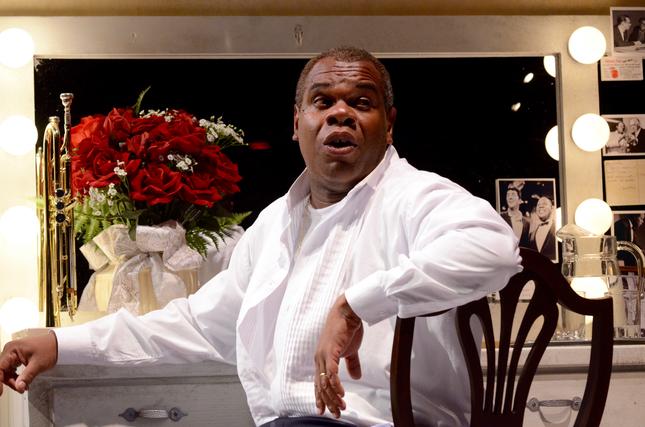Craig Wallace as Satchmo — and 2 More — at the Waldorf
By • September 6, 2016 0 1166

In some web entries, Craig Wallace is described as a classical actor, which is technically true, for sure.
But if you look at his credits, his attitude about and passion for theater and the Washington theater community, the short version might better apply: Craig Wallace is a classic actor.
The record of his work — most of it anyway — will lead you to Washington and to companies like the Shakespeare Theatre Company, the Folger Theatre, Woolly Mammoth, Round House, Arena and Ford’s.
He’s in the middle now of a very busy phase, something he shares with his companion and partner, the actress Kimberly Schraf. Both have been working a lot, which is one of the joys of being part of a community. “This [Washington] is a rich theater community, and we’ve chosen to make our life here, in this town, as a part of that,” Wallace said in a telephone interview.
Last year at around this time, he was in “The Guard,” a new play and part of the city’s glorious festival of works by women playwrights, this one at Ford’s Theatre, where Wallace is considered a part of the working family, a place where he’s done Editor Webb in Thornton Wilder’s “Our Town” and the patient driver opposite the gifted Nancy Robinette in “Driving Miss Daisy,” among other roles.
Currently, through Sept. 25, he’s helping Mosaic Theater at the Atlas Performing Arts Center launch its second season with “Satchmo at the Waldorf” by Terry Teachout, a project which all but demands a tour de force effort from him. Eleanor Holdridge is directing, sets are by Andrew Cohen and lights by Albert Segarra.
In “The Guard,” Wallace managed to play the Greek poet and epic tale-teller Homer and a contemporary dying poet, a not-so-easy stint for an actor. But “Satchmo,” which was an off-Broadway hit for Teachout, drama critic for the Wall Street Journal and a noted biographer, ratchets up the difficulty level. It takes place in 1971 at the time of Louis “Satchmo” Armstrong’s last public performance.
Armstrong had built a towering public performance career, the kind that moved across lines of race and ethnicity. He was a universally beloved figure as a trumpet player and a singer — think of “Hello Dolly” and “What a Wonderful World” — and he had become an American cultural ambassador, a status that both enriched his fame and bedeviled his reputation in the jazz community and in the African American civil rights community.
In “Satchmo,” Wallace, who is an imposing stage presence in any part that he takes on, plays not one, not two, but three roles, making the play a kind of one-man show with a three-part challenge.
“Yeah, I guess you can say it’s a bit of a challenge,” Wallace said. “You’ve got Louis Armstrong, an American legend, you’ve got his long-time Jewish manager Joe Glaser and you’ve got Miles Davis, a kind of a rival who’s critical of him for what Davis thinks is a commercial sellout.” There’s a lot of tension here. Glaser, it turns out, left Armstrong out of his will, which isn’t so much a monetary thing as a shock because Armstrong thought they were close friends. And he has to take on Davis, who in the play is a figure that embodies how some people saw Armstrong.
“So, no, it’s not smooth and easy,” Wallace said. “But it’s not a conversational thing, they’re not going back and forth. It’s a matter of transitioning. It’s voice, feeling and lighting. I do a little bit of singing, but it’s the voice, his voice that matters. I mean, I can sing, but this isn’t a musical. Terry basically said that you try not to imitate the voice, but get a suggestion of the voice. But Davis and Armstrong, there’s issues of authenticity, in terms of civil rights, in terms of music and jazz.”
Talking with him, you get a sense of a man who’s at home with himself and his life as an actor. “This is such a great place to be an actor, I think. You end up doing so many parts. But I remember when I was at Howard University here, and I fell in love. I fell in love with Shakespeare, and I was so lucky to get into Michael Kahn’s classic acting classes. So many good people. The late Emery Battis, Fran Dorn [Franchelle Stewart Dorn]. And Ed Gero. He was and is my friend, and my mentor — a talented, gifted actor.”
You end up talking roles and jazz and Shakespeare and dogs. Wallace and Schraf are on their second huskie, named Victor. “He’s the man,” Wallace said.
Although he’s performed with other companies, “that experience, that master’s program, of being able to do Shakespearean parts small and large — that made me not want to leave this city.”
“You get so many opportunities, so many challenges, and you’re part of a community that’s full of amazing talent. I loved getting to work with Nancy, and with Edward early on.
“In this play, with every play, you raise your game,” he said.
The connection with Gero and Ford’s Theatre gets another twist later this year, when Wallace takes over as Scrooge in the annual production of “A Christmas Carol,” a tradition as deeply ingrained as the lighting of the National Christmas Tree. Gero has played Scrooge for the past seven years.
“Different challenge, for sure,” Wallace said.
But right now, it’s Louis Armstrong, it’s Satchmo, icon and legend, and it’s also the agent, it’s Miles Davis.

